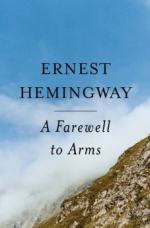|
This section contains 929 words (approx. 4 pages at 300 words per page) |

|
SOURCE: A review of A Farewell to Arms, in Saturday Review of Literature, August 6, 1949, pp. 32-3.
In the following essay, Hackett asserts that Hemingway's hero in the novel represents a false concept of male dignity.
In one detail time has dulled the luster of Ernest Hemingway's A Farewell to Arms. He had gone through the First World War with the Italians and he put much of his own experience into that brilliant book. When he issued it in 1929 the story was still fresh but familiarity with war material now makes it a little trite. A wholly imagined experience, as in The Red Badge of Courage, is the kind that keeps its salience, though Stendhal and Tolstoy triumphed in spite, of knowing the actuality of war.
As an artist, however, Hemingway turns the background of war to his special purpose. It is a defect that his hero's enlistment with...
|
This section contains 929 words (approx. 4 pages at 300 words per page) |

|


